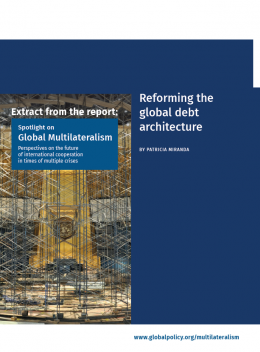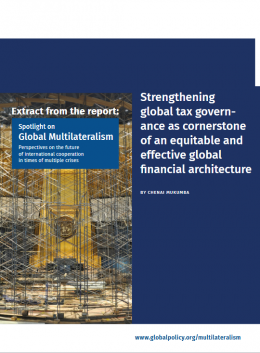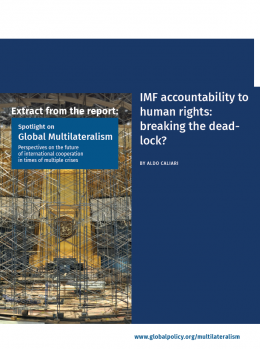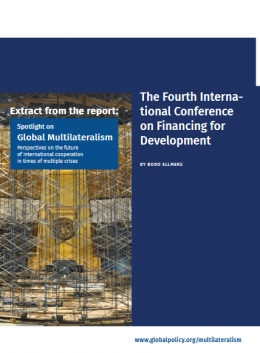
Reforming the global debt architecture
By Patricia Miranda
Debt distress, defaults and the increasing debt burden on the budgets of countries in the Global South are a threat in the current context of multiple crises, putting in evidence the fragility of the current financial architecture and taking the world backwards in the elimination of inequalities and poverty. At the same time, we are witnessing a lack of timely and efficient measures to deal with current debt problems but also to prevent debt deterioration in many countries. The impacts of pursuing conventional mechanisms that don’t fit the need for a long-term debt resolution are regrettably borne by the people that are more exposed to economic, social and climate vulnerabilities.
The experiences and failures of debt restructuring efforts reflect the fact that there is a “non-system” in place for an ordered debt restructuring mechanism and this is why in the middle of a polycrisis with no precedents, with debt trends increasing while debt service is prioritized at the expenses of people, the international financial community needs to start urgently taking the right steps towards debt architecture reform, as part of a new financial architecture that finds a fair balance of power between developed and developing countries.

Strengthening global tax governance as cornerstone of an equitable and effective global financial architecture
By Chenai Mukumba
It has been said that ‘tax is the price we pay to live in a civilized society’. Indeed, the social contract is premised on the idea that businesses and citizens should pay a certain amount of money to their governments and in turn governments provide key public sector services such as a legal system, defence, clean water and education. In many countries, however, the social contract is largely broken. Particularly in developing countries, the tax to GDP ratio ranges from between 10 to 15 percent of GDP, which results in limited domestically mobilized resources. And in these countries, the provision of many public services is limited.
While there is much that can be done at the national level to improve the levels of domestic resource mobilization, national economies do not operate in a vacuum and are affected by decisions that are made at the global level. Much has been written about the importance of national level reforms such as improving the capacity of tax administrations, introducing the use of technology, strengthening legislation--however, to do so singularly without focusing on the importance of global reforms is woefully inadequate.
The importance of these reforms lies in that, without addressing them, national level efforts to curb illicit financial flows are undermined. One cannot only focus on reforming domestic policies without addressing the questions of where these illicit financial flows end up. In 2015, the members of the High-Level Panel Report on Illicit Financial Flows from Africa stated that:
“[I]llicit financial outflows whose source is Africa end up somewhere in the rest of the world. Countries that are destinations for these outflows also have a role in preventing them and in helping Africa to repatriate illicit funds and prosecute perpetrators."

IMF accountability to human rights: breaking the deadlock?
By Aldo Caliari
The human rights obligations of the Bretton Woods Institutions, and the IMF in particular, have been matters of debate for several decades. The IMF considers that, as a monetary agency, international human rights law does not apply to it. However, changes in the international monetary system and growing knowledge about drivers and implications of macroeconomic and structural policies have led the institution to address an expanded range of issues in member countries. Some of the topics currently covered by the IMF, such as social spending and inequality, clearly fall under the application of human rights standards, while others traditionally under IMF jurisdiction have, nonetheless, human rights implications to consider. This article proposes creating a panel on the human rights dimensions of IMF programmes as a way to break the deadlocked debate on the existence of obligations under international human rights law. The body would examine and provide recommendations to IMF staff on situations where individuals or groups allege damage as a result of an IMF loan or programme implemented by their government, in contradiction with the human rights obligations of their country.

The Fourth International Conference on Financing for Development
By Bodo Ellmers (GPF Europe)
The Fourth International Conference on Financing for Development, tentatively scheduled for 2025, offers a key opportunity for reform. This is urgently needed considering that the international financial architecture is deeply dysfunctional and a lack of finance the main constraint for development in the global South.The situation has additionally been worsened by multiple crises.
With the United Nations as lead-organizer, FfD 4 is a better place to pursue the reforms that developing countries need than exclusive bodies like OECD or G20
